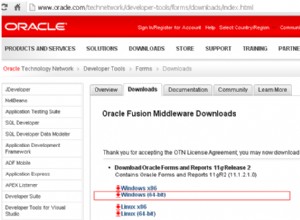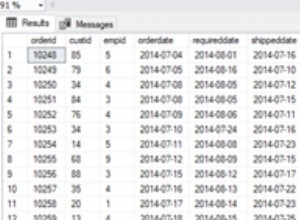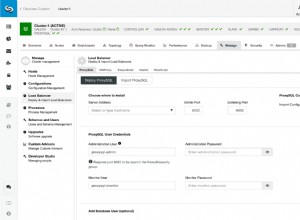Devi GROUP BY id e la condizione "più di un ordine" va in un HAVING clausola (perché è un vincolo su ciascun gruppo, non su ogni singola riga nei dati di input). L'aggregazione avviene con LISTAGG .
with
test_data ( id, product, code ) as (
select 1, 'Apple' , 145 from dual union all
select 1, 'Grapes', 146 from dual union all
select 2, 'Orange', 147 from dual union all
select 2, 'Apple' , 145 from dual union all
select 2, 'Plum' , 148 from dual union all
select 3, 'Grapes', 146 from dual union all
select 3, 'Orange', 147 from dual union all
select 4, 'Grapes', 146 from dual union all
select 5, 'Orange', 147 from dual
)
-- End of test data (not part of the solution). Query begins below this line.
select id, listagg(code, ' | ') within group (order by id) as codes
from test_data
group by id
having count(*) > 1
;
ID CODE
-- ---------------
1 145 | 146
2 145 | 147 | 148
3 146 | 147
Tuttavia, in Oracle 10 non hai LISTAGG() . Prima di Oracle 11.2, un modo comune per ottenere lo stesso risultato era utilizzare query gerarchiche, come di seguito:
select id, ltrim(sys_connect_by_path(code, ' | '), ' | ') as codes
from (
select id, code,
row_number() over (partition by id order by code) as rn
from test_data
)
where connect_by_isleaf = 1 and level > 1
connect by rn = prior rn + 1
and prior id = id
and prior sys_guid() is not null
start with rn = 1
;
MODIFICATO :
Se è necessario prima "distinguere" CODE ripetuto per lo stesso ID, quindi - utilizzando la seconda soluzione - sono necessarie le seguenti modifiche, entrambe nella subquery più interna:
-
cambia
SELECT ID, CODE, ...aSELECTDISTINCTID, CODE, ... -
cambia
ROW_NUMBER()aDENSE_RANK()




